An explorer is a very unique job in Korea. An explorer’s life is unstable and he or she sometimes suffers from life-threatening experiences because they search for places that are out of reach. Nam Young-ho, a graduate of Department of Photography at Chung-Ang University, is actively working as an explorer, chasing his passion regardless of these risks. With CAH, let's find out about Nam Young-ho, who is challenging the first "World's 10th Great Desert Crossing".
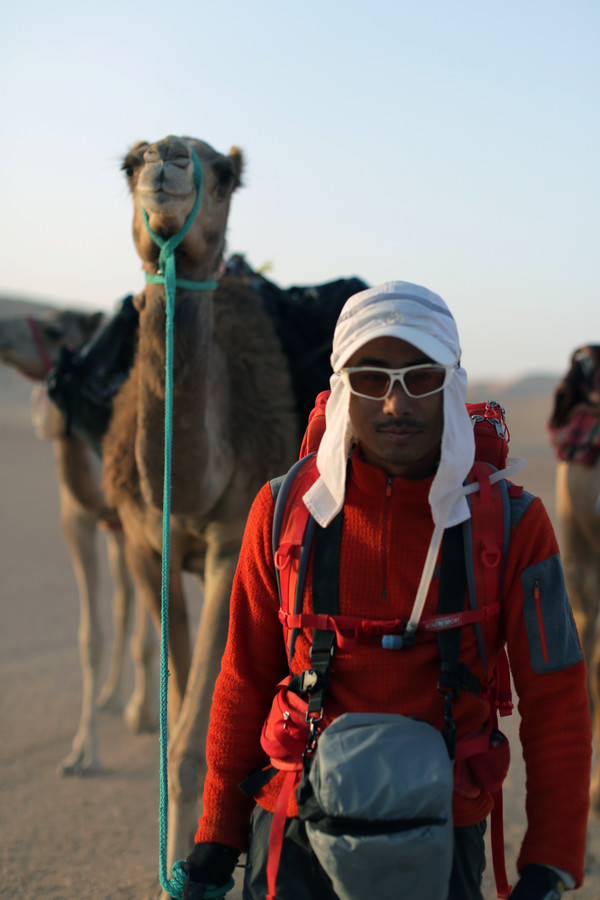
# Start for Interview
1. Please introduce yourself for Chung-Ang University students and readers of Chung-Ang Herald.
Hello! I am Nam Young-ho. I entered Chung-Ang University in 1995 and graduated in 2004. Now, I am actively working as a desert explorer and photographer.
2. How was the campus of CAU in the 90s when you attended?
The campus is a place of youth, always bright and lively. The past and present of CAU campus are no different. When I was at CAU, the campus was giving students free vibes and CAU was an enjoyable place more than anywhere else. I sometimes sat on the lawn talking or watching movies on campus with my friends when I was a student.
3. When you were a student at Chung-Ang University, as a photography major, Did other people ever ask you to take photos at various events such as festivals?
When I was at CAU, there were about 60 students a year in the Department of Photography, which is not a small number. So people rarely asked me to take pictures. Instead, people asked me to sing a lot at such festivals because I was a member of the CAU band .
# Life as an Explorer and Photographer
4. After graduating from Chung-Ang University, you worked as a reporter for the magazine mountain, and then toured 13 countries by bicycle for 230 days. You said that you wanted to explore the desert during your 230-day trip. Why?
Unlike traveling for fun as a student, exploration to unknown places is to experience new cultures. Traveling from China to the Middle East, I had many unfamiliar experiences, and this was the first time I encountered the desert. As I walked the Taklamakan Desert and passed through the Dasht-e Kavir, I became curious about those places. Explorers go to mountains, jungles, or polar regions a lot, but there are only a limited number of explorers who tackle deserts. So, I became more interested in deserts and wanted to explore them.
5. Have you ever felt very lonely during the exploration?
I've never had a hard time during the exploration because of the feeling of loneliness. I don't really think living in a city with a lot of people next to me fulfills my loneliness and feelings of emptiness either. Eventually, I think that my mind by itself is what really matters, not people around me. When I started adventuring, I was bored at first because I didn’t know what was happening to other people while I was out. However, having time to just focus on myself helps me a lot when I feel burdened by my complicated relationships. What bothers me is not loneliness, but separation from my family. For example, when my son was just born, I had to go on an expedition. I feel very sorry for not being able to spend much time with my family.
6. There is a risk of contracting various diseases because you explore for a long time. Have you ever had a hard time with sickness? How do you manage your health to prevent contracting diseases?
Explorers face much more diversified situations and risks than an ordinary person. Therefore, the explorer must be in quite good health. Before I go on an expedition, when I decide a route and a destination, I decide how many calories I will consume and how much stamina I will use per day, so I don’t overstep my limitation and go beyond what is planned. Nevertheless, there were times of difficulty when I overworked for a long time, but I never got sick.
7. Your hometown is Yeongwol-eup, Gangwon-do. That place has a more nature-friendly environment than Seoul. Did these nature-friendly environments affect you to become a desert explorer?
My hometown did have a huge impact on me becoming an explorer. Let me give you an example of a river. A river has a headwater that is the starting point, and numerous tributaries which are attached to the headwater to increase the width of the river. Just like the rivers, my hometown Yeongwol-eup is only one of the numerous tributaries of my entire life as an explorer. It does mean something to me, but I think my intellectual curiosity and the people I met as I grew up had a much greater influence to me.
8. As an explorer who can face numerous dangers, when you go on a desert expedition, you are likely to have a lot of worries around you. What was the reaction of those around you when you first decided to leave for the desert?
When I first said I was going to be an explorer, people around me said I was crazy. In Korea, there are only two or three professional explorers, so being an explorer is a very unfamiliar profession. Because of this, people around me worried a lot about me.
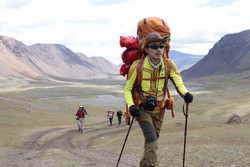
9. When you go on an expedition, you stay away from Korea for a few months and you have to focus on your exploration as you move away from civilization. How do you balance your work and life?
Exploration and life in Korea are not different. Because I am an explorer, before going into the wild there are many things I need to prepare. After the expedition, I use the contents I made and spend time with many people. These are all extensions of the exploration. So, all of my time is like exploring. But in addition to these explorations, balancing my life with the family is necessary. I have to be a father and husband so that my family doesn't feel uncomfortable because I don’t stay with them for several months while I'm on an expedition. My family likes and understands my exploration life, so it all works out.
10. When you crossed the Taklamakan Desert in China, you experienced an extreme situation where you have to cross the desert without GPS. What was the situation you were in at the time?
At that time, western China was a very politically sensitive place. When we arrived, there was a tank in front of the station and the soldiers were filming it and sending it to the troops. We went with a broadcast team, and the soldiers were holding a camera and taking pictures of us showing how to use GPS with a camera. The soldiers saw it on camera and interrogated us. In the end, we were accused of spying, imprisoned for three days, and they confiscated all our equipment. They returned the rest after inspecting the confiscated equipment but did not return the GPS. However, I did a lot of simulation before going on an expedition, and because I had studied the satellite map up close and mostly memorized it, I was able to explore since I had a rough map in my head.
11. When exploring the desert, how do you find drinking water? Due to the weight of water, it seems like you cannot carry all the water to drink on a desert expedition for several months. Are you looking for an oasis in the desert to drink water? If you can't find water, how do you ask for help?
First, I need to bring as much water as possible. However, it is practically impossible to take all the drinking water because water is very heavy. There are ways to store water on camels, and there are also ways to find an oasis. However, I can't drink the water I find in the desert right after finding it. I have to filter it. I also should practice drinking as little water as possible, and persevere without drinking water. However, if death is imminent due to lack of water, it is time to send a signal to the rescue team. In fact, there was a time when someone I was exploring with was in distress and asked for help.
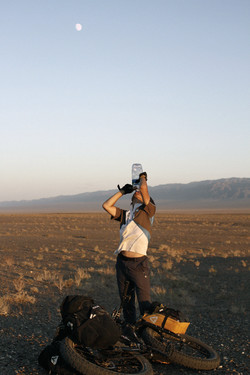
12. In 2010, while exploring the Ganges River in India, you were attacked by bandits, encountered sea robbers, and went through life-threatening situations. After the expedition, you had a hard time suffering from social phobia due to the aftermath of the accident. What was the driving force that helped you to overcome this trauma and go on a desert expedition again?
In the end, to get out of the trauma, we have to go through the exact same situation again. If I can't overcome it, it's my eternal homework. No matter how well I do other things, the trauma of that certain situation still remains in my heart. It's important to have a chance to get over it! It was really hard at first, I think I struggled for a year, but after all, I am an explorer... trying to get over it.
13. Rather than becoming an explorer who only thinks about exploration, you emphasized the ‘social role of an explorer,’ and donated photos that you took during your adventures to the organizations under the Ministry of Education, and shared various stories from your experiences through lectures and books. When sharing your experiences with people, what is the most important thing to you?
I still think I need to do much better on this. It takes a lot of effort to use the experiences and witnesses of explorers as valuable content. What I think is important is that, whether you're an explorer or a mountaineer, it's not enough to just set your own records. Exploring just for the sake of setting records is a waste of time and value. We should share valuable experiences with people and inspire them with what the explorers felt in the adventures.
14. In a situation where the Internet is overflowing with information, and the network market is constantly developing that enables sharing of information easily and quickly among people, what does exploring mean to you?
We can tell when, where, and what is happening just by looking at maps and the Internet. However, I think knowledge and experience are very different. There is a big difference between the knowledge I learned from books or the internet and what I experienced in person. And, I think the concept of exploration needs to change. The conventional notion of exploration is that conquest still prevails, as expeditions are initiated by people to discover new resources and continents. However, we should throw away this thought, and we need to re-examine and rediscover the places we already know.
15. What is the charm that only the desert has?
I think the charm of deserts is emptiness, silence, and nothingness. There is no other place like the desert. No sounds, no lights... There is a healing power that these places give. I think that everyone should feel the silence of the desert at least once in their life. When I'm in the desert, I can naturally organize my thoughts. At first, I had a lot of thoughts, but as time passes, the unimportant things get away from me, leaving only really meaningful and important things.
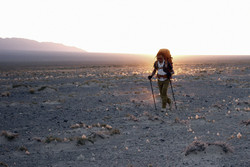
16. You have explored many deserts. Which one is the most memorable?
I remember places that were dangerous and the places where I felt honored. The most memorable place is the Arabian Desert. When I heard of one European explorer who had been there with camels, I contacted him for advice. He said it would be hard to explore there because I'm Asian and I do not have any relationships with the royal families there. Since the exploring started with Europeans in the past in the way of conquering lands, he was implying that exploring is only for Europeans, not for other races. However, I did not give up and went on an expedition with my team. When I went there, miraculously, the King of Abu Dhabi opened the door for us and I was able to go to the desert. As soon as we entered the desert, the sand dunes felt so beautiful and enchanting. There was an escort of Jeep cars and I remember eating a lot of lamb. I have a very honorable memory of having an official record ceremony by the royal family. Since then, I think I've been exploring more diligently.
17. As an explorer and photographer, which do you think is more important: capturing beautiful landscapes with photos or capturing moments with your eyes?
I don't think it's a hard issue to deal with. Of course, it is important to keep it in your mind, but I think it is also important to record it in photographs. I think it is worthwhile not only to feel what I experienced through exploration, but also to show others the beauty and mysteriousness of deserts to impress it upon them.
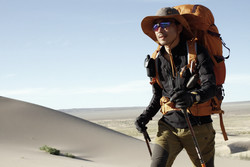
18. In entertainment shows dealing with exploration such as “Law of the Jungle” and “Themes Around the World,” there seems to be slightly different parts from reality due to the broadcast directing. What is the difference between exploration on TV and actual exploration, and what kind of emotions do you feel about the entertainment shows?
I’ve also appeared in a lot of exploration shows. Since the purpose of entertainment programs are literally to give pleasure to people, I don't think risking lives to explore is the purpose of broadcasting. Therefore, it is natural that there are directions in broadcasting shows. Of course, there are differences from real exploration, but I think it's good to just enjoy watching these programs as they are. Personally, I wish there were more programs like this. Because I think those programs will give more people interest in wild, nature, and exploration.
#Concluding the Interview
19. How did Chung-Ang University affect your career as an explorer and photographer, and your life as a person?
Among many universities, the reason I came to Chung-Ang University was because I thought that the Department of Photography at CAU was the most recognized. Chung-Ang University is a school that specializes in arts. Like other classmates, I could graduate from school and become a photographer, but the reason I became an explorer seems to be the free atmosphere of the school and the uniqueness of my friends who were learning the arts together. Although I was in school for a long time, I have no regrets about it. I think that the experiences I had while attending school, such as traveling around the world, meant a lot to me.
20. Please give your advice and support to Chung-Ang University students who are working hard towards their dreams.
One day, the word “mentor” started to become popular, and people are too engrossed in finding a mentor. I also wanted someone to lead me, and I asked my seniors for advice, but I experienced frustration when my seniors told me not to become an explorer. However, those words stimulated me and gave me the opportunity to explore deserts more diligently. So, I would like to advise Chung-Ang University students not to be swayed by other people's words and to carve out the path they want to go on their own. If you pioneer your own path, you will naturally find many good mentors around you.

